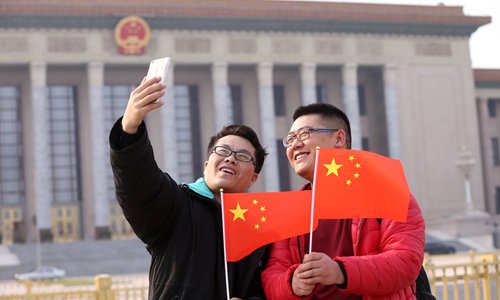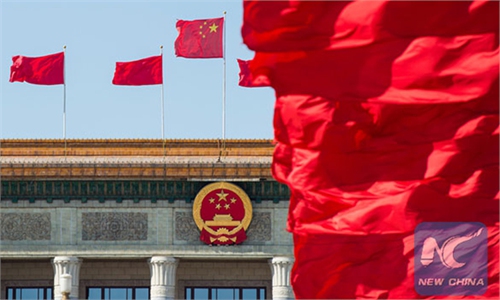This year's two sessions not to accept journalists applying from overseas due to epidemic control

Visitors pose for a selfie with Chinese national flags in front of the Great Hall of the People in Beijing. The hall is where China's "two sessions" are convened each year. Photo: IC
Amid sporadic COVID-19 cases in some Chinese cities and mounting pressure on preventing imported cases, this year's two sessions - the Fourth Plenary Session of the 13th National People's Congress (NPC) and the Chinese People's Political Consultative Conference (CPPCC) - the most important annual political events in China, will invite reporters who are already in Beijing to cover the events and will not be open to reporters applying from overseas.
This year's two sessions will convene on March 4 in Beijing. The NPC and the CPPCC announced on Sunday that in order to effectively prevent and control the epidemic and jointly safeguard public health, this year's media coverage of the two sessions will learn from last year's arrangement.
A number of domestic and foreign reporters in Beijing will be invited to cover the meeting, but reporters who apply from overseas will not be on the list. Interviews with NPC deputies and CPPCC members will mainly be conducted through online, video or written forms, like last year, according to the arrangement.
A source close to the matter told the Global Times on Monday that deputies and members will arrive in Beijing on March 3, and the meetings are also expected to be shortened to seven days, like last year.
Reporters who attend the meetings will be required to take nucleic acid tests, and some of them who attend the special meeting of ministerial officials may be requested to be vaccinated, the source said.
Many NPC deputies reached by the Global Times said 2021 marks the beginning of the country's 14th Five-Year Plan period (2021-25) and the main task for this year's convention is to approve the plan.
Meanwhile, China has seen the curve of infection numbers flatten in multiple places, including Beijing and Shanghai, as well as the densely-populated northern province of Hebei, which analysts said indicates a phased success in curbing the disease, and that a large-scale outbreak is unlikely this winter.




